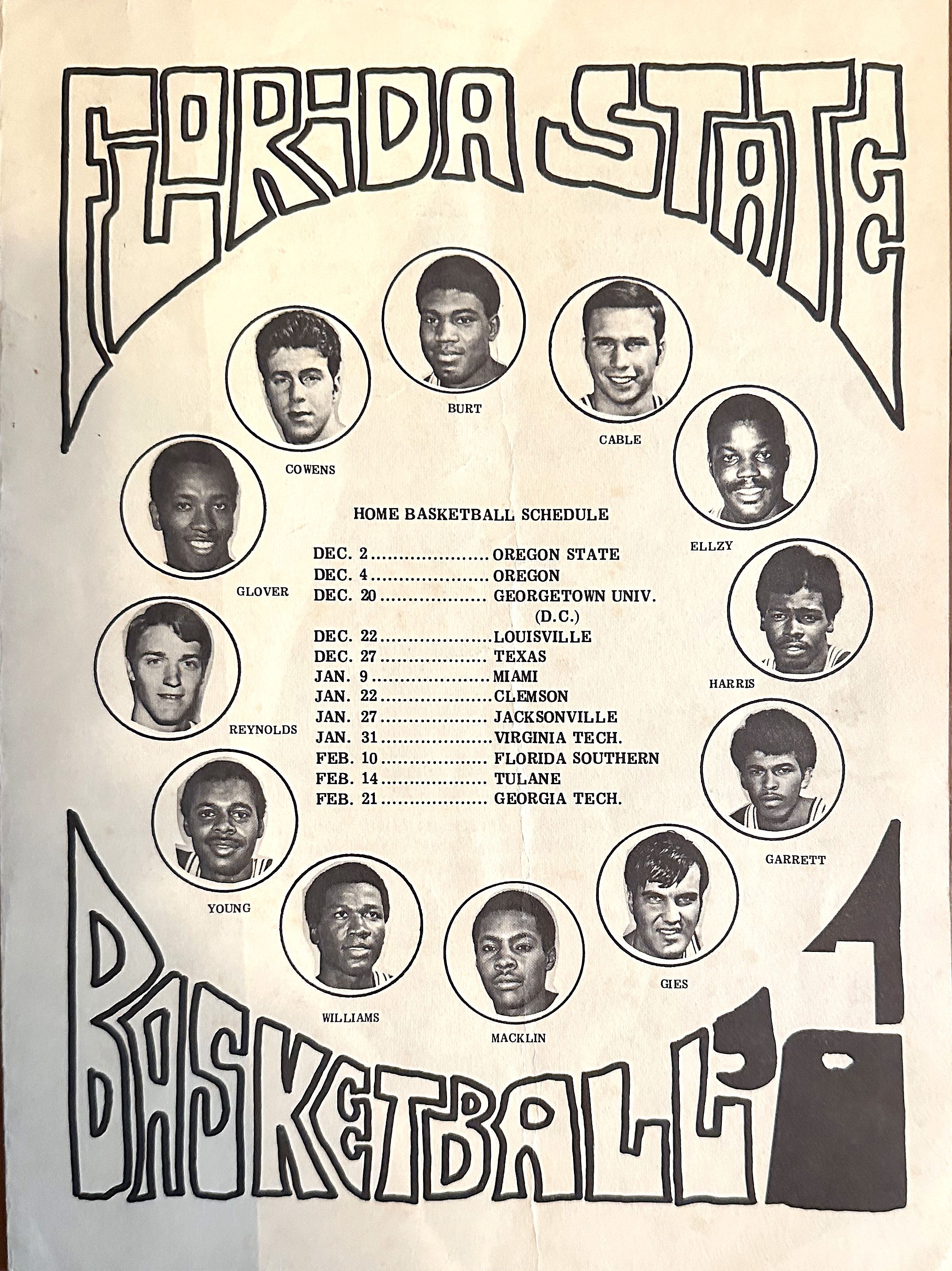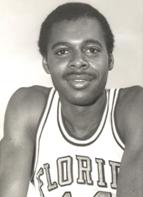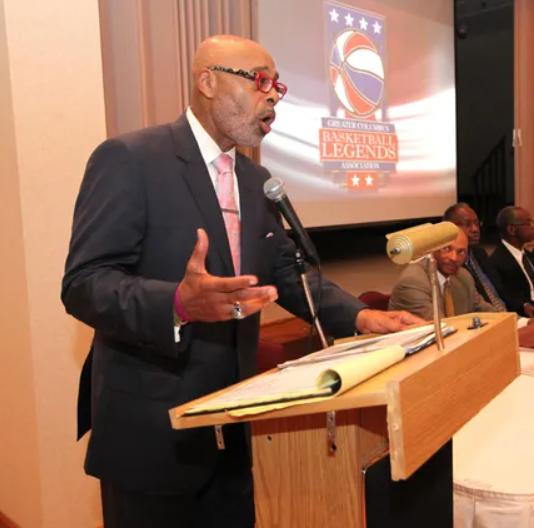"Skip" and the "Busted Flush"
By Jim Joanos
 |
Ahmad Aliyy, formerly known as “Skip Young”, died on March 5, 2023, at the age of 73. Aliyy had a central role in the integration of FSU basketball. I was fortunate to have watched him play basketball when he was the point guard of the “Busted Flush” as well as to have been an acquaintance of his in his later life. The Busted Flush refers to FSU’s basketball team of the 1969-70 season in which the starting five consisted of four black players and one white one.
In the late sixties and early seventies, FSU’s basketball team under Coach Hugh Durham was a pioneer among southern school coaches in integrating its basketball team. The first black basketball player at FSU was Lenny Hall who played for a few minutes in 1966 before an injury ended his career. By 1969 of the FSU basketball team’s twelve primary players, eight were black. Skip Young, as Aliyy was known then, was the point guard on that team.
 |
Skip Young |
In the fall of 1969, Coach Durham asked me to serve as chairman and help him reorganize FSU’s tipoff club, the basketball support group. I was quite surprised but flattered by the offer. Up until then I had only a marginal interest in FSU basketball. Yes, as a high schooler I had gone to some of FSU’s first games in the old West Campus gym. In college, I had several friends that were on the basketball team. In addition, I had enjoyed following the exploits of some great FSU shooters including Jimmy Oler and Hugh Durham. In short, I was a fan but had not attended many basketball games since college days. In any event, I accepted Coach Durham’s request. As a result, I was able to enjoy up close some of the best basketball teams that FSU has had in its history. The 1969-70 season was especially enjoyable.
Aliyy was one of Durham’s early recruits and came to FSU as a freshman for the 1966-67 season. He had been on an Ohio state high school championship team and honored as player of the year in his school’s division. He turned down an offer from Ohio State to come to FSU. When, he got to FSU, he was as required then, a member of the freshman team that first year. There were two other African Americans that came to FSU at the same time, fellow freshman John Burt and junior college transfer Willie Williams. By the time that Aliyy was a senior and point guard on the 1969-70 team FSU’s program had been well integrated. It was not an easy transition.
Aliyy and the other pioneer black players did not find life easy at FSU. Home games were not as bad but, on the road, they were subjected to lots of abuse from opponent fans. They were called names and bands would play Dixie when they came out on the court. In conversations that I had with Aliy in later years he told me about nasty, threatening letters that he received. The abuse together with the fans’ slow acceptance of FSU’s style of basketball bothered Aliyy. On at least one occasion, he considered leaving FSU and playing out his career in Ohio. Fortunately, he stayed at FSU throughout it all.
The 1969-70 season could be regarded as the best regular season ever for FSU, before, or since, as far as the won-loss record. The team won 23 games and lost only three for an 88.5 per cent winning record. The three games that were lost were all on the road. Early in the season, the team won the Gator Bowl tournament in Jacksonville beating Army by 35 points and the University of Florida by 25. An especially sweet victory was a home one against previously unbeaten Jacksonville University. Like FSU, JU had embraced desegregation early on and as a result had a nationally competitive team. This was a JU team that boasted of “twin towers”, Artis Gilmore and Pembrooke Burrows, both over seven feet tall, as well as greats, Rex Morgan and Chip Dublin. Unfortunately, the FSU team was on probation for what today would be regarded as minor infractions pertaining to recruiting so was not eligible to play in the NCAA tournament at the end of the season. The JU team that FSU had split two games with made it all the way to the NCAA championship game where it lost to UCLA. It was a wonderful season for FSU. At the end, Cowens would be drafted in the first round of the NBA draft by the Boston Celtics and went on to have an illustrious pro career. Several others on that team including Aliyy would later play in the NBA.
The eight black players on that team included Alliyy, Williams, and Burt as well as Ron Harris, Ken Macklin, Roy Glover, Rowland Garrett, and Vernell Ellzy. The four white players who had primary roles were Dave Cowens, Randy Cable, Jan Gies, and Carl Reynolds. The FSU team that year scored more than 100 points on six different occasions. Twice they scored over 122 points. Keep in mind, all baskets then were for only two points. The three-point rule had not come into being. Aliyy was especially crafty as a point guard, Cowens did his thing not only as a rebounder and pressing defensive player but scored often and put up big numbers.
During the season, after all the home games, Coach and Mrs. Durham would host social gatherings at their home where FSU tipoff club members were invited to attend. Some of the fans would bring snacks. One was regular in bringing shrimp and other Panacea seafood. These were special events where we could discuss the games with the Coach and celebrate the victories.
Aliyy had one more season at FSU after that one, but unfortunately got hurt before the season began and played only sparingly during the 1970-71. At the end of that season, Aliyy was drafted in the fifth round by the Boston Celtics. He was a reserve for the Celtics for about a year and then was with the Kentucky Colonels of the American Basketball Association briefly. He was plagued by injuries so terminated his pro basketball experience and returned to FSU to finish up his degree work.
 |
Ahmad Aliyy |
Aliyy got his FSU’s bachelor’s degree in 1973. After graduation he worked in several state government jobs. He did well in government positions and eventually served in several very responsible positions including one with the Florida Commission on Human Relations.
Throughout his life, basketball remained close to Aliyy’s heart. Among his many basketball endeavors, he was at one time an assistant coach at Rickards High in Tallahassee, coached basketball camps for kids, and even in 1997 conducted a basketball camp for young people in West Africa. He also found time to teach courses as an adjunct professor at FSU. He was very popular as a teacher of subjects pertaining to political implications of African Americans in sports.
One of his most heralded accomplishments was as head coach of the girls basketball team at FAMU DRS High School. In the eleven seasons that he coached that team they went to seven final fours and won three state championships. He also made time to serve on an FSU athletics committee where I very much enjoyed and was enlightened by his participation and wisdom.
Rest in peace, Ahmad, after a life well lived. Thanks for the memories.
About the author:
 |
Jim Joanos |
Memories of Garnet and Gold
Jim Joanos and his wife Betty Lou have deep roots at Florida State University. Avid sports fans, they have literally seen, and done, it all. Fortunately for us, Jim loves telling first-hand accounts dating back to FSU’s first football game, a 1947 clash with the Stetson Hatters on Centennial Field, where Cascades Park is today.
The Osceola will run a series of these colorful stories written by the former Tallahassee lawyer and judge, which we feel our readers will find enlightening and/or nostalgic.
Jim and Betty Lou, who was Associate Director of the FSU Alumni Association (1991-2003), have been married 65 years and are each listed as one of FSU’s 100 Distinguished Graduates. The couple were enshrined in the FSU Hall of Fame in 2015 as Moore-Stone Award Recipients. Ironically, both Deans Moore and Stone were instrumental in the Joanoses career development.
“Both Jim and Betty Lou Joanos have been exemplary fans and supporters of Florida State University, both academically and athletically,” said Andy Miller, retired President and CEO of Seminole Boosters, Inc. “You can’t go to an athletic event of any kind that you don’t see both Jim and Betty Lou Joanos together. They love their university as much as they love each other.”